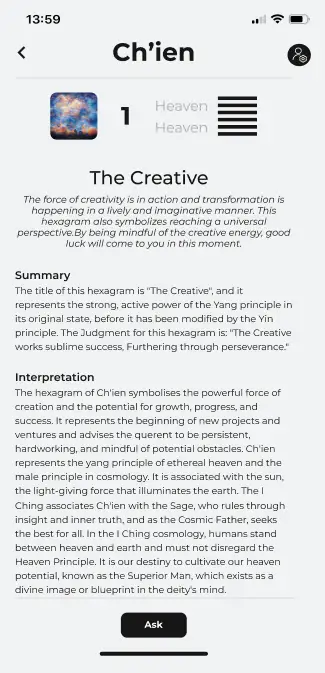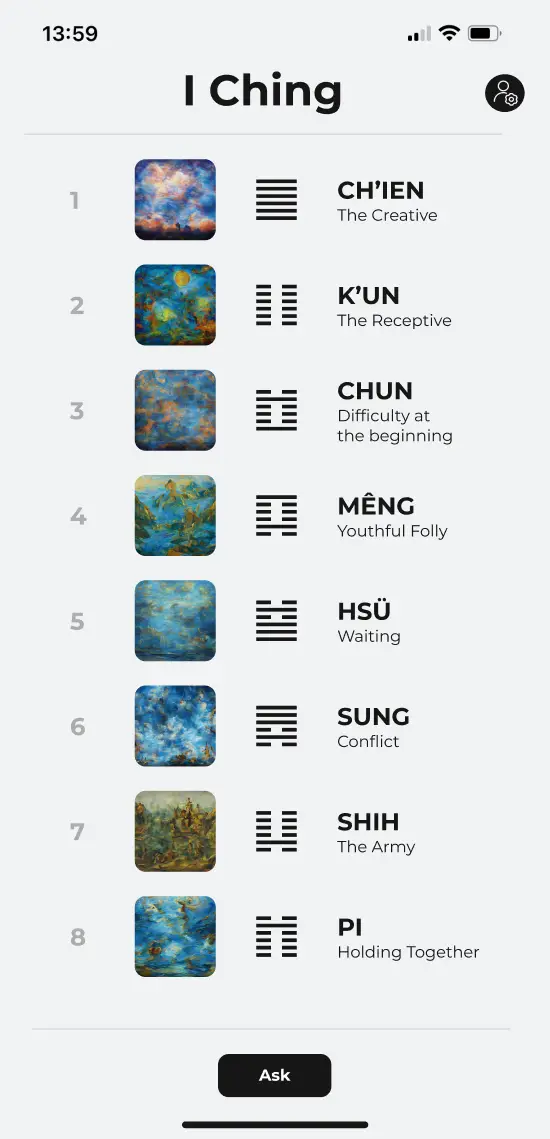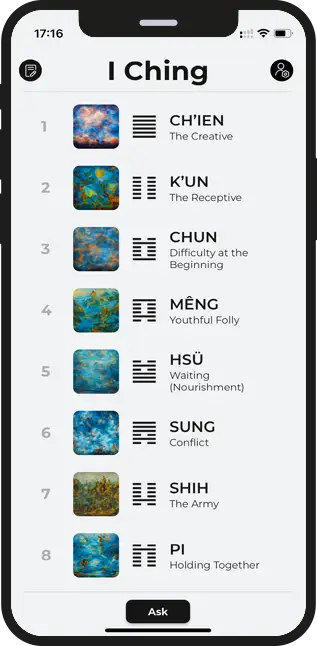
Water
Lake
Hexagram 60 - Limitation - CHIEH
Embracing limitations and setting boundaries can be a powerful tool for personal growth and development. By operating within certain limits, we are forced to become more creative, resourceful, and focused
Summary
Hexagram 60, Limitation, is about setting boundaries and limitations to achieve balance and stability. The key takeaways from the judgment and image are that it is essential to find the right measure in all things and to avoid excess. This hexagram can indicate a time when it is necessary to be cautious and to hold back to achieve success in the long term.
Interpretation
Setting reasonable limits is crucial for personal growth and success. It advises us to be mindful of our limitations and to work within them. Overly harsh or excessive limits can cause rebellion and hinder progress. We should set our limits based on our goals and responsibilities and be patient and gentle with ourselves as we make gradual progress. The hexagram also reminds us to be humble, avoid arrogance, and seek cooperation and compromise in our interactions. Ultimately, we can achieve balance and steady progress by setting practical limits in all areas of life.
This hexagram can be interpreted as a reminder to be mindful of our knowledge and understanding limits. It advises us to be humble and open-minded and seek guidance from a higher power or wise teachers to gain greater insight and wisdom, also as a warning against excess and imbalance. It advises us to be moderate in everything, including our emotions, desires, and actions. It reminds us that too much of anything can be harmful and that balance and harmony are essential for a fulfilling life.
This hexagram can be interpreted as a reminder that life is full of limitations and obstacles and that our response to these challenges ultimately determines our success or failure. It advises us to be patient, persistent, and resilient in the face of adversity and to use our limitations as opportunities for growth and learning.
Sage Advice
Find inner peace by letting go of attachments and aligning oneself with the natural flow of the universe. To do so, it's essential to detach from the ego and the desire for control and, instead, trust in the natural flow of events. This way, one can access the innate wisdom and guidance of the universe and make decisions that align with the natural order of things. The hexagram advises us to be flexible and adaptable to change and to maintain a humble and open-minded attitude. Doing so can find harmony and balance in all aspects of life.
In addition, it's important to be aware of our limitations and seek the guidance and support of others. The hexagram represents the idea that great things can be accomplished by working together and seeking the help of those with the necessary skills and knowledge. This way, one can avoid overreaching and achieve success in a balanced and harmonious way.
The I Ching also advises us to be patient and avoid forcing things to happen. Instead, we should allow events to unfold naturally, trusting that the universe will provide us with the opportunities and resources to achieve our goals. Finally, the hexagram reminds us to be grateful for what we have and to focus on the present moment rather than constantly striving for more. We can cultivate inner peace, wisdom, and spiritual growth by embracing these principles.
Line 1
Suggests that it is important to respect boundaries and limitations in order to avoid blame. This can be interpreted as an encouragement to stay within our comfort zones and avoid taking unnecessary risks that could lead to negative consequences. However, it can also be seen as a reminder to maintain a sense of humility and avoid being overconfident. At the same time, the line also suggests that help will come to those who exercise discipline and self-restraint. Recognising and respecting our limitations can create a solid foundation for success and growth. This can be achieved by focusing on our inner dignity and avoiding the temptation to meddle in the affairs of others or to become arrogant. Overall, the first line is an invitation to approach life with caution and respect for boundaries while maintaining a strong inner discipline and self-awareness. Doing so can create a solid foundation for growth and progress and attract the support and assistance we need to achieve our goals.
Line 2
To make a successful retreat, one must know the dangers of disengaging from a situation. Taking matters into one's own hands and trying to force a conclusion can be tempting, but this can lead to misfortune. Instead, stepping back and disengaging from the other person's ego is essential. However, hesitating to retreat can also be disastrous, leading to stagnation and missed opportunities. This line advises that when obstacles dissolve, it is vital to seize the day and take action with awareness and caution. Rushing forward without consideration can lead to further obstacles and misfortune. This line speaks to the importance of timing and awareness in taking action. Sometimes the best action is to retreat and disengage, but this should be done deliberately and mindfully. Similarly, when obstacles dissolve, and opportunities present themselves, acting decisively but not impulsively is vital. Taking the time to assess the situation and consider the best course of action can lead to more successful outcomes.
Line 3
Reminds us of the danger of excessive self-importance and indulgence. When we become too focused on proving ourselves or asserting our ideas, we risk losing sight of our true purpose and missing out on valuable opportunities. This line advises us to be humble and avoid indulging in our egotistical extravagances, whether through self-assertion or temper tantrums. Remembering our role and staying focused on our goals without becoming too attached to proving ourselves or gaining something from each interaction is essential. By being aware of our mistakes and working to correct them, we can avoid blame and move forward on our path with greater clarity and purpose. It also serves as a warning against excessive self-importance and indulgence. When we become too focused on asserting ourselves or proving our ideas, we risk losing sight of our true purpose and missing out on valuable opportunities. This line reminds us to stay humble and avoid indulging in egotistical extravagances, such as temper tantrums or self-assertions. Instead, we should stay focused on our goals and remain aware of our mistakes so that we can work to correct them. Doing so can avoid blame and move forward with greater clarity and purpose.
Line 4
Advises to work with the natural limitations of a situation rather than trying to force success. Success can come through being content with what is possible and not striving for what is not. It is essential to keep attuned to the situation's flow and recognise the peak moments of opportunity rather than trying to push past them. This line suggests following the path of least resistance and allowing the natural flow of events to guide us. When there is an opening, we can move forward with balance and harmony, and when the way is closed, we can withdraw willingly into stillness and wait for the right moment to act. This approach requires patience, trust, and a willingness to let go of our desire for control.
Line 5
Reminds us that to guide or limit others effectively, we must first embody the same self-limitation and discipline within ourselves. We must set the correct example and be gentle and truthful in our interactions with others. Doing so can inspire their cooperation and help them attain inner independence and freedom from fear and doubt. This can be achieved by turning all matters over to the cosmos and accepting the limitations that come with them. By doing so, we can experience the good fortune that comes with sweet limitations and the support of the cosmos.
Line 6
In times of crisis, severe limitations may be necessary to protect ourselves or others. This line reminds us that although such limitations may seem annoying, they can be essential for achieving our goals and avoiding regret. However, we must also be mindful not to impose too severe or unjust limits. We should always treat ourselves and others with kindness and compassion, even during times of necessary restraint. It also warns us not to make giant leaps of progress through severe self-imposed limitations, as small, steady improvement steps are more effective and sustainable. Finally, the line emphasises the importance of moving towards truth without hesitation, even if it requires sacrifice and discomfort.








